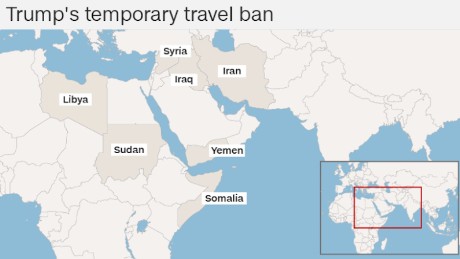Trump’s Travel Ban Faces Criticism
February 5, 2017
On Friday, January 27th, President Trump signed an executive order that prohibited travel to the United States from seven specific countries in the Middle East and Africa and suspended admission for any and all refugees for 120 days. The countries listed in the executive order were Iran, Iraq, Syria, Sudan, Libya, Yemen, and Somalia. All the nations have a majority of Muslim citizens. Trump’s administration cited possible reasons for issuing a travel warning: places that might have an unstable government, ongoing civil war, terrorists, and the list continues. However, this executive decision has not been taken lightly.
The current travel ban, which is defined as a “travel warning” by the current administration, has caused massive outrage around the country. Many people see this as a violation of the Fourteenth Amendment. The Fourteenth Amendment addresses U.S citizenship and naturalization of immigrants protecting all people’s rights and preventing discrimination. As Junior Michael Hill puts it, “these bans are unconstitutional and violate the equal protection clause, which prevents this kind of discrimination against a certain group”.
Trump’s administration has specifically targeted several Muslim countries, barring immigrants from coming into the United States. According to CNN, the administration’s criteria for banning specific countries into and out of is based on keeping America at its safest. Junior Molly Lipsett sees safety as “a more secure vetting process than what we have now” for eliminating terrorists and threats.
In addition, this also means that even foreign-born U.S residents, if they leave the country, might not be allowed to re-enter the United States under the immigration order that has been put into place. According to the Washington Post, U.S District Judge Ann Donnelly granted the order petitioned by lawyers supporting the American Civil Liberties Union on behalf of the people from mainly dominant Muslim countries, who were kept at airports when the ban took effect.
Even many representatives in Congress, from both political parties, disagree with Trump’s executive actions and are working to help people detained in airports.


































